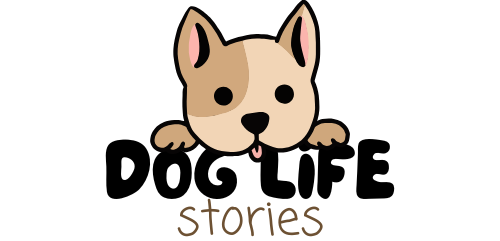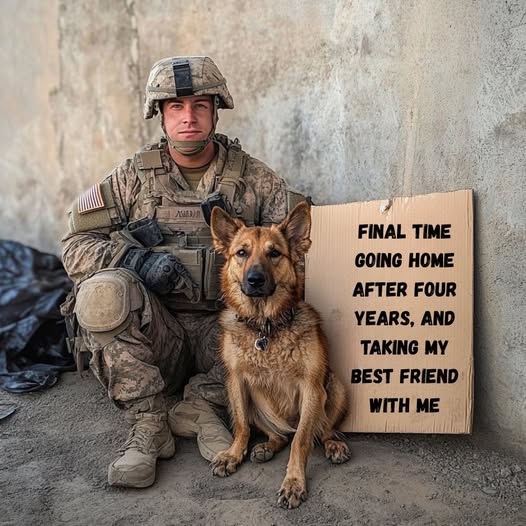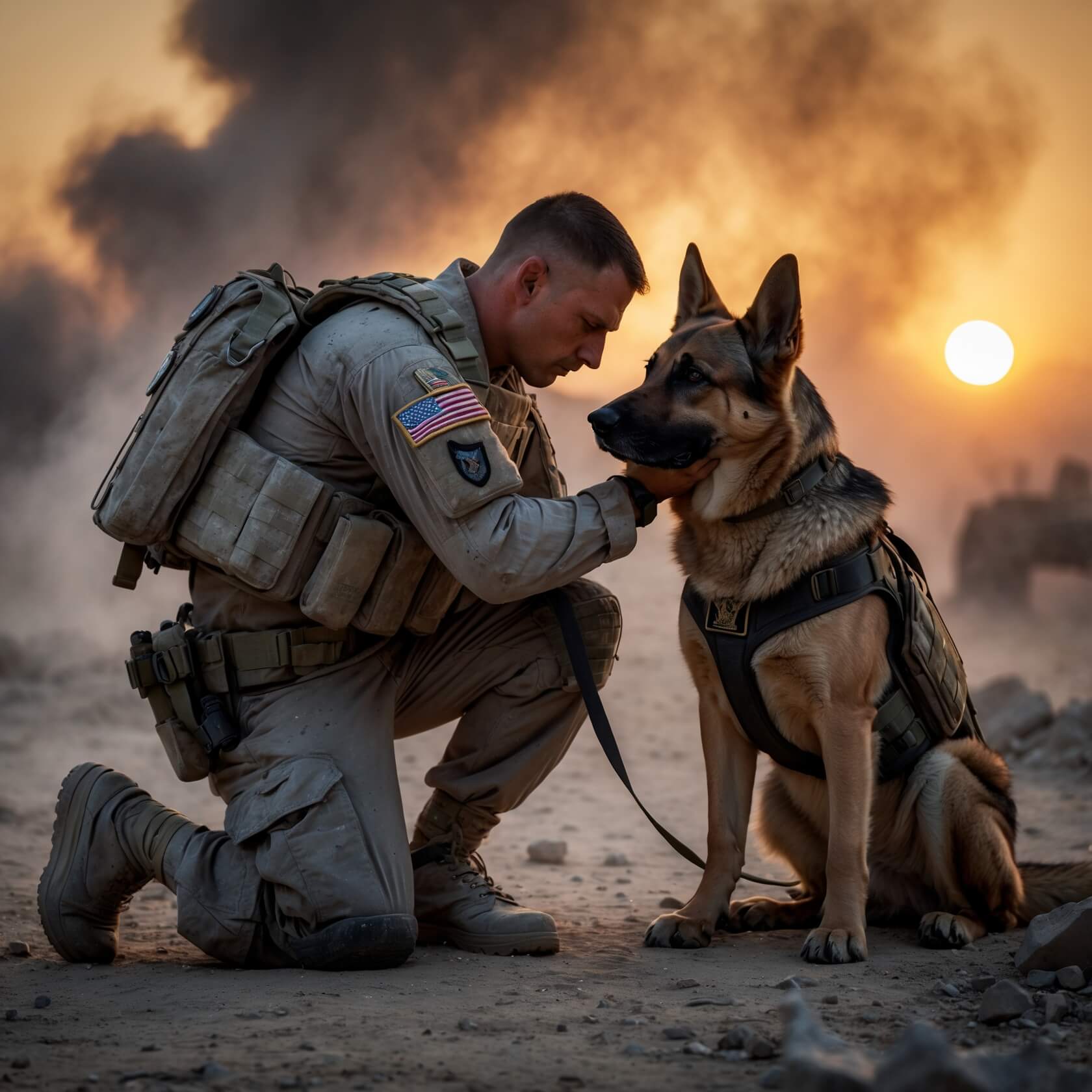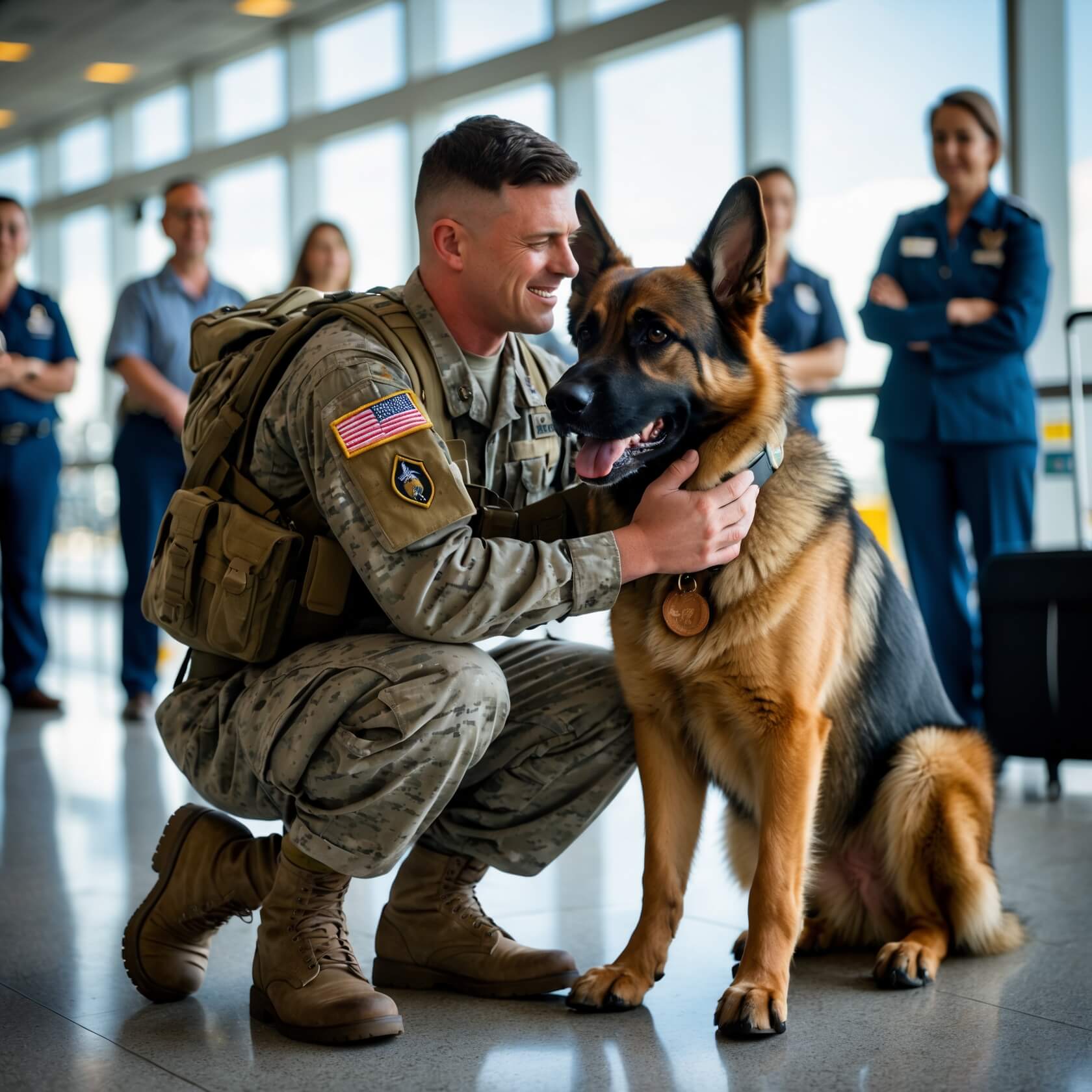Paws of Valor: The Unbreakable Bond Between Sergeant Wells and Scout
Sergeant Jackson Wells could still taste the desert dust on his tongue as twilight bled across the sky, painting the base in bruised purples and reds. Four years of sandstorms and sirens had carved lines into his face, grooves where the fear and adrenaline had pooled night after night. He stood outside the barracks with his helmet hanging from one hand, feeling oddly naked beneath the growing hush of evening—and beside him, sitting perfectly still, was the only soul who had witnessed every one of those nights: Scout.
He remembered the first time he’d met the Belgian Malinois pup, all oversized paws and serious, dark eyes. Back then Jackson had thought he’d already learned what love and loyalty meant—until the little dog trotted up and leaned against his calf like they’d already shared a lifetime. In that instant, amid the motor-pool fumes and shouted commands, something gentle wrapped around Jackson’s heart. He named the pup “Scout” on the spot; even then, the dog seemed born to go first, to brave every doorway so Jackson wouldn’t have to walk through it alone.
War, however, is greedy. It devours innocence quickly, and Scout’s puppy clumsiness hardened into deadly, disciplined grace. Together they swept crumbling apartment blocks where every cupboard or crib might hide a trigger wire. Jackson would give a silent hand signal, and Scout’s ears would flick forward, his nose quivering as though he could sniff out fear itself. The explosions, when they came, pounded through their bones, and yet afterwards Scout always came back to Jackson’s side, pressing his head against the sergeant’s knee, grounding him, reminding him he was still human.
Some nights the firefights ended so abruptly that the silence hurt more than the noise. Jackson would sit beneath a shattered window, rifle across his lap, and talk softly while he scratched the ridge between Scout’s ears: about the Colorado mountains that smelled of pine and cool rain, about his kid sister’s terrible violin recitals, about the peach pie his mother baked every Fourth of July. Scout never judged the tremor in Jackson’s voice or the way his words sometimes crumbled into exhausted sobs; he simply listened, eyes gleaming with an understanding no human language could match.
On their final deployment a roadside bomb took out the lead Humvee. Jackson felt the blast ripple through the convoy like a heartbeat skipping a beat—and then chaos. Smoke, screaming, shrapnel. Scout leapt into the dust cloud without hesitation, dragging a wounded private clear of the flames by the cuff of his uniform. Later, when the medics loaded survivors onto helicopters, Jackson realized his hands were shaking so badly he couldn’t reload his weapon. Scout nudged those trembling fingers until they stilled. In that moment, Jackson understood that courage was something they kept trading back and forth: when one’s well ran dry, the other poured in what was needed.
Now the war was finally ending for them. Inside the dim barracks Jackson printed a makeshift sign on a scrap of plywood—black marker, block letters: FINAL TIME GOING HOME AFTER FOUR YEARS, AND TAKING MY BEST FRIEND WITH ME. He propped it against his rucksack while Scout tilted his head, curious. The words looked almost defiant, as if daring fate to interfere after everything it had already taken.
Yet the joy of going home carried needles of guilt. Jackson thought of the buddies who would stay behind to finish their tours, of the empty bunks that would never again be slept in. He could hear their laughter echoing down the corridors, ghostly and unfinished. Leaving felt like deserting them, even though they hugged him and thumped his back, teasing that he finally got to ditch the rations for real food. With Scout’s leash wrapped around his wrist, Jackson boarded the transport plane fighting tears he’d refused to shed on the worst nights of combat.
Somewhere above the clouds, Scout curled himself into a tight cinnamon-colored ball against Jackson’s boots, trusting the roar of the engines the same way he trusted gunfire—a sound they could survive together. Jackson stroked the dog’s flank and let memories tumble across the cabin: the first time Scout found an IED seconds before detonation, the proud tilt of his ears when he earned his harness patch, the gentle lick against Jackson’s cheek whenever nightmares dragged him screaming awake.
Touchdown came with a jolt—and spring sunlight pouring through the open cargo door felt like baptism. On the tarmac, Jackson’s mother broke through the crowd, arms wide and shaking, her eyes skipping from her son’s face to the dog at his side. Scout wagged so hard his entire back half wobbled, then sat in polite, soldierly calm so she could hug him too. For the first time in four years, Jackson inhaled air that smelled of cut grass instead of cordite, and a sob escaped him—half grief, half overwhelming relief.
That night, long after welcome-home banners were folded away and the house had gone quiet, Jackson lay on the living-room floor with Scout’s head on his chest. Moonlight silvered the scars on his forearm, the ones Scout had licked clean while the medic worked. Jackson whispered, “I couldn’t have done it without you, buddy,” his voice cracking like dry earth after rain. Scout’s tail thumped once, soft and sure.
There, in the hush of a home they had both risked everything to see again, dog and soldier drifted toward sleep. Outside, the world moved on—cars passing, wind in the trees—unaware of the sacred promise sealed in that room: that whatever battles lay ahead, visible or invisible, they would face them heart-to-heart, paw-in-hand, forever bound by a love fierce enough to outlast war itself.







